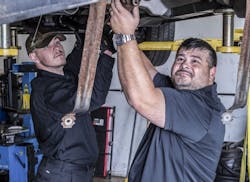Andrew Nemeth’s one year in Afghanistan had produced a whirlwind of memories that barraged his everyday, making it impossible for the United States Army veteran to be content with sitting in this call center, pushed away in this corner, stuck in this cubicle, with nobody who could comprehend the emptiness he felt.
Nobody who could offer advice.
Nobody who cherished the kind of camaraderie he had built with his unit.
Nobody who could possibly fathom the mental anguish that was continually mounting on him as he answered phone call after phone call after phone call.
Nobody.
And then he met Minor Mobley.
Two years later, and Nemeth doesn’t spend his day sitting slumped in a chair, stirring in that despondency. You can now find him underneath the hood of a vehicle, working for a man who does understand Nemeth’s emptiness, who helps him cope, who appreciates that sense of camaraderie, who offered him a job that provides meaning and fulfillment in his post-war life.
As a former Marine himself, Mobley has big aspirations for his small, four-man shop, Excel Automotive Repair in St. Charles, Ill., which he plans to staff almost entirely with veterans someday. He has a mission in this industry, in this country, which is not only plagued by a technician shortage, but also mounting unemployment rates for veterans: Don’t just seek out veterans and give them a job—give them a job that matters. Give them a setting where they feel safe, and a chance at a better life.
“Not only are they loyal,” he says, “but if you can understand veterans and speak their language, then you’re bridging that gap and forming that camaraderie that they’re used to, and they’ll become the best people you’ve ever employed.”
All About Integrity
Mobley stood in front of his staff each morning and said those same seven words:
“It’s all about integrity and customer service.”
It wasn’t just some cheesy, empty motto he used on customers—he claims that mentality helped take a franchise location he managed for several years from fifth-worst in the company’s network to one of the most profitable in just six months.
Growing up repairing vehicles with his father, brother and sister, automotive repair isn’t just a job for Mobley. The “integrity” of auto care is everything to him, and he relates it right back to his military career.
“If you’re not doing your job correctly, guess what? Somebody’s life is at stake,” he says. “You have to be 100 percent focused and 100 percent dedicated to making sure people stay safe. If you’re saying that to individuals that have served our country, they’ll look at everything different.”
That mentality definitely spoke to his lead technician at the franchise, Hector Plaza, whose father and uncle both served as Marines. Once Mobley moved on from the franchise two years ago, Plaza decided to join Mobley as general manager and lead technician at his new shop.
But Mobley needed one more technician, and he wanted to hire a veteran.
The Real Problem
Mobley doesn’t share much about his military experience: He served six years in the U.S. Marine Corps, spent some time overseas, and finished up his service in Virginia.
Beyond that, he’s much more focused on the future. And the future of veteran employment in this country, Mobley says, depends entirely on how we treat the rising unemployment numbers amongst veterans (see sidebar).
For Nemeth, who falls into the Gulf War-era II statistic (anyone who joined the armed forces after 2001), says simply finding a job—which he did with the call center quite easily—isn’t necessarily the problem. To him, making a successful transition back into the workforce consists of more than an office and a steady paycheck.
“I just didn’t care about the work I was doing,” he says. “I missed being part of a team.”
So after learning Nemeth, who attended Mobley’s church, was interested in automotive repair and dissatisfied with his call center job, Mobley approached him about working for Excel Automotive.
“He had this mental lag he couldn’t get past,” Mobley says. “It’s hard to relate if you haven’t been there and know what it’s like to be at war. Sometimes, you can have a little PTSD. Sometimes you can feel like you’re missing something.”
2015 Veteran Unemployment Numbers—
- There are 21 million veterans in the U.S., accounting for 9 percent of the 18-and-over population.
- Male veteran unemployment is at 4.5 percent, and female rates are at 5.4 percent.
- Among the 495,000 unemployed veterans in 2015, 57 percent were 45 and over; 37 percent were 25 to 44; and 5 percent were 18 to 24.
- Unemployment rates range from 1.9 percent in Iowa to 7.7 percent in the District of Columbia.
- The unemployment rate for 3.6 million Gulf War-era II veterans is at 5.7 percent for men and 6.4 percent for women.
*Reported by the Bureau of Labor Statistics
The Real Solution
Exclusively hiring veterans isn’t some gimmick for Mobley. To him, veterans personify the best kind of employee: hardworking, trustworthy, loyal, helpful.
“If you’re committed to doing honest work and you’ve got the right team, if you give [veterans] direction, they’ll take it better than anyone,” he says.
Creating the proper setting for veterans has been a slow process for Mobley, who plans to soon grow his staff to five, but he says with enough attention, any shop owner can mimic what he’s accomplished over the past two years:
Form an open environment. First and foremost, when the shop initially opened, Mobley wanted Nemeth to feel comfortable openly speaking about his time served in Afghanistan.
“Him and I would have conversations about all the baggage he was carrying from the military,” Mobley says. “For both of us, it was therapeutic to have somebody to talk to about it with.”
Keep an open-door policy with veterans, and even consider paying for therapy if they need more attention outside work hours.
Stress the importance of teamwork. “There were times [Nemeth] came to me and said, ‘I’ve thought about going back to the Army,’” Mobley says. “He said he missed the camaraderie. So as a team, we have to make sure we’re building him up and coaching him and helping him.”
Do whatever it takes to establish a team: host meetings, encourage discussion, establish team systems, and host work outings outside the shop. Essentially, get everyone invested in each other’s success.
Prove you’re invested. While Nemeth was interested in automotive repair, he had very little experience. After their initial conversation, Mobley decided to hire for attitude over experience, and invested in Nemeth’s development.
“We started working on simple things, like oil changes, brake replacements,” Mobley says. “Now it’s been two years, and he’s getting ready to test out for his first ASE certification. He’s grown leaps and bounds from where he started.”
Mobley says to form an apprenticeship program for veterans that partners them with experienced employees, and offer to pay for their training and certification. If you prove you’re invested in them, they’ll return the favor tenfold, he says.
Recognize the importance of discipline. Finally, Mobley says the role of discipline cannot be overlooked.
“When [Nemeth] does something wrong, we discipline him the same way as you would get disciplined in the military,” he says. “It’s not just a write-up. We’re going to sit down and talk about the problem. And they’ll listen, because they want to improve themselves and be the best.”
Mobley says discipline is viewed as a chance for character-building in the military, and that holding employees accountable for their actions is key for their development at a shop. Have a disciplinary process in place that allows you to address problems in a direct way without getting too confrontational. Sternness and rigidity are key.
Get Involved
—
- Army Career and Alumni Program. The Army’s official transition assistance program.
- Transition GPS. The official transition assistance program for the Navy.
- Marine Corp’s Transition Assistance Management Program. The official transition assistance program for the Marine Corps.
- The Air Force Personnel Center. The official transition assistance program for the Air Force.
- Coast Guard’s Transition Assistance Program. The official transition assistance program for the Coast Guard.
- Veterans Employment and Training Services (VETS). A program from the U.S. Department of Labor aimed at matching employers with military veterans.
- Military.com’s Veteran Employment Center. Job-posting and -finding forum powered by Monster and available through Military.com.
- 5 Star Worldwide. Hiring and recruiting company with two specific initiatives (Veterans Joblink and 5 Star Recruitment) for military veterans.
- Hire Veterans. A national 501(c)(3) nonprofit aimed at helping veterans find employment.
- Hire Heroes USA. A job search site for military veterans.
- 3M Hire Our Heroes. A tool grant and scholarship program for veterans.
Making a Difference
Mobley acknowledges he’s in a different situation than most shop owners trying to integrate veterans into a financially successful shop—he’s starting with veterans and working his way up. But as he continues to brand his business as a “veteran-owned shop,” Mobley he’ll slowly start to integrate more and more veterans into the trade.
So far, it couldn’t be going better, as he just hired his second veteran this past month. And not only is he seeing real results with Nemeth, who is now an integral member of a shop that earns $800,000 in annual revenue, but after several charitable efforts for veterans, he claims the community is steadily embracing his business as the area’s most trustworthy shop.
“We get a ton of veterans that come through here and use our facility,” he says. “We’ve even got a couple World War II vets that treat this place like a barbershop. People are really on board with our message, and it’s going to pay off in every way.”
You Can Always Do More—
As veteran unemployment numbers continue to remain high year in and year out, Mobley knows he cannot solve the crisis singlehandedly—but he can contribute outside the automotive industry as well.
Donate to veterans. Mobley’s staff will buy used vehicles, work with vendors to donates parts, and perform the labor for free in order to donate vehicles to veterans in the area.
Excel Automotive also hosted a concert last year that raised funds for granting wishes to veterans.
“If they wanted to go to a football game, we got them tickets, and we’d even get them out on the field,” he says.
Address the shortage outside your shop. If a veteran isn’t right for his shop, Mobley still makes a habit of finding that prospective employee a job elsewhere.
“We had one guy who we gave trial to and wasn’t a fit for us, but he knew construction,” Mobley says. “So we talked about issues he was having, we went back and forth, and I held him accountable. I called him all the time, made sure he had his résumé put together, asked if he was applying to school. Now, he works for a construction company and is studying for his business degree.”

